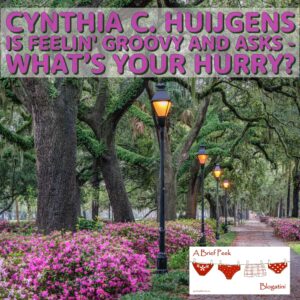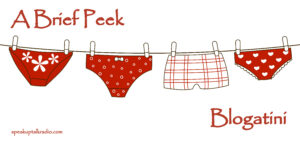What’s Your Hurry? by Cynthia C. Huijgens

There’s a reason Simon and Garfunkel wrote a song with the lyrics ‘slow down you move too fast, you’ve got to make the morning last.’ We, humans, have a tendency to rush not just our mornings but our entire lives. We have somehow gotten it into our heads that running towards a goal is better than walking and that fast production is preferred to something slow or handmade. Why exercise for an hour when 7 intense minutes will yield similar results? And how many of us move from one thing to the next in a state of almost mental automation, never making eye contact with the people we pass along the way, filling our brains with more ideas and tasks to accomplish? Why do we do this to ourselves? Why do we carry this crazy need for speed into our writing process? I’d like to challenge all you writers out there to put on The 59th Street Bridge Song, and after a good listen, ask yourself this question: what’s your hurry?
Are you rushing to make money? Don’t bother. Sadly, very few writers earn a living from their writing. According to the Society of Authors, in 2006, median author earnings were £12,330 ($15,905). In 2022, the median fell to £7,000 ($9,030), a drop of 33.2% based on reported figures, or 60.2% when adjusted for inflation. Earnings are even more meagre for self-published authors who may receive a higher royalty per book but incur all the publishing and marketing expense. That’s a difficult pill to swallow when you learn that the average self-published book sells only 250 copies.
Are you afraid someone will get there first? How many times have we read a book that is essentially the hero’s journey, yet we continue to want more. Why? Because we all want to be that hero, to heed the call to adventure, to overcome the obstacles and problems in our path, and to return to the place where our story began as victorious: a stronger, more courageous, and actualized human being. But maybe your story isn’t a hero’s journey but a very personal memoir or children’s cookbook? Whatever book you want to write, you should write it, regardless of what others have written. Be inspired, but be original. And take your time. As an avid reader, I can tell you a well-written book is worth waiting for.
Did I just hear you say you have imposter syndrome? You may be thinking you are not as talented or qualified to write a book as someone who has had the privilege of attended a masters program or has published one or more bestsellers, but that shouldn’t stop you from becoming a writer. Nobody likes rejection. As a writer, you have to learn how to receive comments, good and bad, and filter them through a lens that makes sense to you. Self-doubt is sometimes what keeps us moving too fast. So I say, give yourself permission to go your own way. Don’t measure your success against anyone else’s. Find people you trust to read and critique your work in progress and let your story develop in its own time, buoyed by your nurturing hand and guided by those trusted comments.
In the 59th Street Bridge Song, Simon and Garfunkel talk to lampposts and watch flowers growing, slowing down long enough to take in the magic all around them. I like to think this slowing down made their songwriting stronger and their lyrics more resonant. When we ask ourselves, what’s the hurry? we force ourselves to confront the reasons why we rush through our creative process and hopefully give ourselves permission to slow it down. Who knows, by giving up the need to rush, you just might feel groovy!
Cynthia C. Huijgens is the award-winning author of children’s illustrated books, A FISH CALLED ANDROMEDA and POLAR BEAR AND THE UFO. She uses the tagline, ‘art educator exploring write ideas.’
